Vitamin D2 vs. Vitamin D3. What’s the difference?
There are 13 essential vitamins necessary for good health, and you can get enough of most of them through eating a wide variety of healthy foods. There is one exception to that rule. “A good diet will provide adequate amounts of all the vitamins except D.”1 Vitamin D is actually made by the human body when bare skin is exposed to sunlight. Ultraviolet rays from the sun interact with a specific type of cholesterol found in the skin and produce vitamin D.
Like other vitamins such as vitamin K and B, vitamin D is actually made up of several different forms of the nutrient. The two forms that are used by the human body are vitamins D2 and D3. Since the majority of people do not get enough sun exposure, it’s not uncommon to become deficient in vitamin D, in which case, it becomes necessary to take a supplement. So, should you be taking vitamin D2 or D3 supplements?
Which one is better for you?
To answer this question, you’ll need to understand the difference between the two forms of the essential vitamin. Vitamin D2 can be found in plants; vegetarians or vegans who live a healthy lifestyle and eat a diet high in vegetables are getting more D2.
Although you can get some D3 from consuming animal products such as whole eggs and oily fish, the main way humans get this essential vitamin is through being outdoors and allowing their skin to absorb sunshine. The issue with that concept is that dermatologists recommend using sunblock on exposed skin to prevent skin cancer.
Perhaps the more important distinguishing factor between the two forms of D is that vitamin D3 is more easily converted by the liver and kidneys into the bioactive form of vitamin D that the body needs. The National Institute of Health conducted a meta-analysis on research surrounding whether supplementing with D2 or D3 was more effective at raising the blood serum level of vitamin D. “In conclusion, our results suggest a favoring toward cholecalciferol (D3) rather than calciferol (D2) supplementation with respect to the more effective improvement of vitamin D status.”2
Which one could you use more of?
It’s difficult to get enough vitamin D through natural sources alone and deficiency in the population is rising. In a February, 2020 report, The National Center for Biotechnology Information concluded this: “About 1 billion people worldwide have vitamin D deficiency.”3 Taking vitamin D supplements can help increase your blood serum level of the nutrient. Because it is more easily converted into a useful form, vitamin D3 supplements may be preferred over D2.
Vitamin D deficiency can be more common among people who don’t eat animal products, including the few that contain vitamin D3. In fact, one of the risks of going vegan cold turkey is that there are certain vitamins and minerals that are difficult to get in a plant-sourced diet. Taking a gradual, thoughtful approach to this big lifestyle change allows time to figure out ways to ensure you replace these nutrients.
The vitamins for vegans that VLN offers are 100% plant-based and aimed at supplementing essential nutrients, like vitamin D3, that can be lacking in a diet that includes no meat or dairy.
References
1 On call: Vitamin D2 or D3?, Health.Harvard.edu.
2 Comparison of vitamin D2 and D3 supplementation, Ncbi.nlm.nih.gov.
3 Vitamin D Deficiency, Ncbi.nlm.nih.gov.
NOTE: Harvard Health Publishing, and The National Center of Biotechnology Information (NCBI) have not reviewed or approved the above article.
